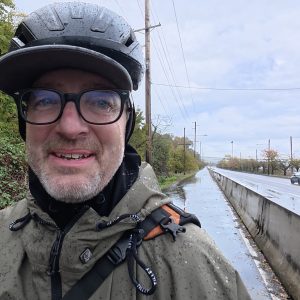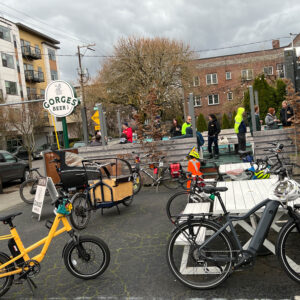
Turmoil and turnover at the transportation bureau, a change in Portland’s bike-friendly narrative, advocacy to be reckoned with, a stronger community — these are just some of the phrases that describe 2023 from my perspective.
After going through the past 12 months of Front Page stories (all 750 of them), I’ve got a pretty good sense of where we were. Where we’re going? That’s anyone’s guess; but this recap of the big stories and ideas should at least make your guess an educated one.
So settle cozy up and settle in for a look back at my big takeaways from 2023…
Just three months into the year we received data from the Portland Bureau of Transportation that validated hunches: bike traffic counts were down significantly in 2022 compared to previous years. Even though the decline mirrored other cities and reflected historic shifts in work commutes, it was no easier to stomach. It was also not easy to explain. I had my explanation, PBOT’s chief bike planner had his, and we heard from hundreds of readers. There’s simply no simple explanation, and we can only hope the changes needed for a riding rebound aren’t nearly as complicated.
Even as we weathered difficult headlines that fueled cycling skeptics, the same inspiring activism that made us #1 for all those years was evident. We saw record crowds during Pedalpalooza, and fun events like The Ladds 500 reached even greater heights of popularity. The national movement of kids riding bikes to school that began in northeast Portland with Sam Balto’s “bike bus” (which itself was inspired by bike buses in Barcelona, Spain) grew up and matured in 2023. There was a bike bus that supported the big teacher’s strike, the “bike bus bill” legislation passed in Salem, and a new local advocacy coalition was formed to push the concept even further.
Yes, 2023 proved that we can still do big bike things, but if we want to be the best cycling city in America, it’ll take even better coordination and collaboration between individual Portlanders, dedicated advocates (paid and volunteer), elected officials, and policymakers.
Let’s start with our friends at PBOT.
To say 2023 was a tumultuous year for PBOT is like saying 2024 will be a memorable national election year in America. Never in my 18 years on this beat have I seen the bureau so demoralized, underfunded, and adrift. PBOT has weathered repeated blows to its reputation: record deaths despite an entire team dedicated to Vision Zero; declining bike traffic despite vestiges of staff and experiences from halcyon days of the previous decade; a failing budget despite success in getting fewer people to drive; compromised infrastructure projects that manage to annoy those who should be natural allies and those who want streets to never change.
It certainly didn’t help that PBOT got assigned to a new commissioner-in-charge, saw its director leave, and weathered a strike from its maintenance division all in the first month of the year.

While the 2023 dice were unlucky for PBOT, my usual sympathies for the bureau were tempered because some of their biggest wounds were self-inflicted. As I rode alongside a smiling PBOT Commissioner Mingus Mapps and PBOT Director Millicent Williams at a Sunday Parkways event in mid-September, I had no idea they were already planning to rip out the protected bike lane on SW Broadway. What made that episode even more galling was that Williams rejected her own staff’s clear (and correct) advice that the move would be a political loser, would erode trust of allies, and would endanger bike riders. It was a bike lane betrayal the likes of which Portland has never seen and I hope we never see again.
While the Broadway bike lane survived, trust between the community, PBOT, and Mapps’ office did not.
That’s why when, about one month later, PBOT contractors tried to remove newly installed bike lanes on NE 33rd Avenue, many reacted with anger. The fact that it was framed by PBOT as an unrelated “mistake” might have saved the reputations of agency leaders, but it was another crack in an already fraught community relationship.
The context of controversies on Broadway and 33rd was one of growing unrest by Portlanders — many of whom were already at a boiling point after one of the deadliest summers in history. In July alone we suffered 14 traffic deaths in Portland. 10 of them involved a driver that committed a crime. One of them involved a southeast Portlander named Jeanie Diaz who was waiting at a bus stop across the street from the Belmont Library on July 15th when an out-of-control driver jumped the curb and killed her.
July’s tragedies all but forced Commissioner Mapps to respond. But it was clearly not enough to assuage frustrations. At a press conference to discuss road safety held on the steps of City Hall in August, he was repeatedly shouted down by protestors.
The electricity in the air sparked again when we released video of a woman being hit by a car driver head-on while bicycling in a “protected” lane on NE 21st Avenue. This led to increased calls for protected bike lanes and created ripe conditions for outrage when news of removing protection on Broadway came out shortly after.
The nonprofit BikeLoud PDX inserted themselves into all these stories. 2023 was the year this group came of age. Forged by the fire of traffic deaths and threats of rolling back progress, the all-volunteer BikeLoud punched way above their weight. The group now has valuable and active communication channels, regular events, merchandise, and a leadership structure that feels durable. To cap off a big year, last month BikeLoud’s lawsuit that seeks to force the City of Portland to abide by the Oregon Bike Bill won a major victory. The one thing BikeLoud is missing is a paid staffer; but I won’t be surprised if they reach that milestone this year.
The Street Trust, Portland’s more well-established transportation advocacy group, reached a milestone of their own in 2023. Their director Sarah Iannarone has molded the group into a regional powerhouse that has transcended their Portland and cycling roots. Now seven years since leaving the name “Bicycle Transportation Alliance” behind, and just four years into Iannarone’s tenure, we’re seeing fruits of their new direction and her leadership. TST’s new Ride2own e-bike lending library program and their yeoman’s work on the new Regional Transportation Plan are two shining examples of how the group has moved far beyond usual geographic, demographic, and political bicycling bubbles.
There was also news last year that Portland itself is ready move beyond its recently-acquired reputation.
In 2023, our invaluable local bike paths showed signs of recovery after years of safety concerns, PBOT finally finished the SW Capitol Highway project, and we got a new bus-only lane on East Burnside. We also learned there’s funding in the pipeline for more safe road projects that come with major pieces of protected bike lanes: A $17 million reconstruction of SW 4th Avenue, and a $6 million project on N Willamette Blvd. A $20 million federal grant awarded back in February, will help PBOT build out their 122nd Avenue plan — a project that can’t come soon enough given that the street claimed six lives in 2023.
With word on the street that Portland’s 2023 bike counts will show an increase over 2022, we’ll need all the safe streets we can muster. We’ll also need more money to keep PBOT in the black. Last year we learned the depths of the disaster that is PBOT’s budget. Despite Commissioner Mapps first foray into fixing it got laughed out of the room by business interests, the year ended on a positive note as Bureau of Environmental Services Commissioner Carmen Rubio threw Mapps a $112 million lifeline via the Portland Clean Energy Fund — a tax on corporate retail sales that had already boosted bicycling and earth-friendly transportation by about $80 million as part of its first-ever Climate Investment Plan that passed last year.
I’ll also remember 2023 as the year we turned the corner on our journey back to being a relevant cycling city. We entertained big ideas like the Urban Trails Network and a “passoire filled” Portland. We also hosted one of the largest gatherings of the handmade bicycle industry ever assembled as over 5,000 attendees made the inaugural MADE Show a huge success.
On a smaller scale, we also established a new weekly event called Bike Happy Hour, that — perhaps more than anything — makes me excited for 2024. Like a social and sedentary version of Critical Mass, BHH is where all types of bike-minded people come together to trade ideas, make connections, and build community. It’s also where we met a bunch of the future leaders of Portland who will represent us on our expanded city council in 2025.
With the historic Portland City Council election just 10 months away, our conversations at Happy Hour last year with promising, optimistic, transportation reform-minded candidates like Robin Ye, Daniel DeMelo, Timur Ender, Chris Olson, Chad Lykins, Steph Routh, Joseph Emerson and Angelita Morillo — give me hope that the work we all did in 2023 meant something and will begin to pay off in 2024.
Thanks for reading. What big things did I forget? If you have an important takeaway from 2023, please share it below… or bring it to Bike Happy Hour tonight (Weds, January 3rd). I’ll be at Ankeny Tap on SE Ankeny between 27th & 28th from 3:00 to 6:00 pm and would love to meet and chat!







Thanks for reading.
BikePortland has served this community with independent community journalism since 2005. We rely on subscriptions from readers like you to survive. Your financial support is vital in keeping this valuable resource alive and well.
Please subscribe today to strengthen and expand our work.
Thank you, JM, and your whole team for BikePortland. You all matter and you are greatly appreciated in this community.
you’re welcome Mick O! I’m doing a separate post that’s more BikePortland-specific and will highlight the work of Lisa and Shannon and get into some of the “What the heck are we doing here” questions and behind-the-scenes business stuff.
2024 is our 19th year!
“My efforts to suggest how development may be directed begin by substituting the word “density” with the word “diversity.” That is to say, an “economically diverse” mix of uses is the more pressing need rather than high density housing which is only one use. This perspective includes city centers, surrounding neighborhoods, nearby towns and commercial districts. What districts within an entire urban/suburban area lack an ideal mix of uses? Where is housing already the dominant land-use and what land-uses are lacking? Where has an incomplete mix of land-uses resulted in noxious and menacing traffic? How may development be directed to include other modes of travel – walking, bicycling and public transit?
As a transit system planner, I suggest Denver’s 16th Street Shuttle as an under-appreciated model to consider, especially its 1983-2012 modest fleet of hybrid buses that were sadly replaced with standard 40′ buses jostling jolting rattletraps which DO NOT convert to EV very well, NOR are they suitable for stop-n-go circuitous routes. Yellow School Bus fleets likewise DO NOT convert to EV very well NOR do paratransit lift-vans which must be easy boarding low-floor for seniors, disabled, school kids and all transit patrons need. A truly modern paratransit van (sans lift) could replace all 3 public transit bus types.”
A bit verbose I admit, off topic, but I needed this missive posted somewhere. Thanks you guys. That reminds me of my new favorite movie: “Free Guy” actor Ryan Reynolds as an A I who played the good guy.
As soon as most organizations get that first paid staffer, the mission creep really sets in – chasing after grants to pay for staff rather than to fund programs for the mission – and the organization will quickly become very “conservative” in that they won’t do anything that rocks the boat (think Street Trust). BikeLoud can pay temporary 1099 MISC gig workers if they need services carried out – but I sincerely hope they avoid the pitfalls of hiring permanent staff by just not starting.
Your comment chimes with my experience of nonprofits also: full-time staff exercise outsized influence on the running of the organization and in many cases effectively squeeze out volunteers who would like have a say in how the organization runs.
Effective nonprofits that bring on full-time staff are very, very careful to choose people who will continue to nurture and value volunteer involvement. The others wilt and die, unless they can find other means of support, as The Street Trust has done.
The other thing I’ve seen again and again is that the all-volunteer board will eventually become totally dependent on a key staff person or set of people to do all their advocacy for them – sometimes this is deliberate on the part of the staff person(s) who wants some sort of job security – and future board members will be selected by their willingness to let staff do what they want to do, rather than what the board or membership wants them to do, letting the mission slide even further into oblivion.
“Employee capture.”
Almost one year of taking the downhill lane on SW Capitol every day, and so far no tickets or even any honks from angry drivers. I encourage others to join me and normalize this practice.